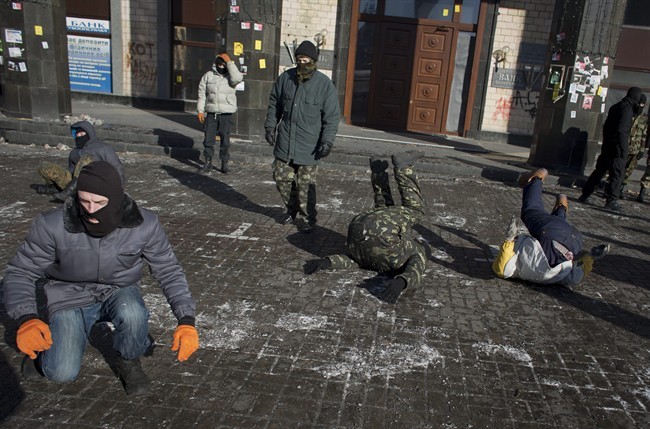KYIV, Ukraine – Leaders of the anti-government protests that have gripped Ukraine’s capital for more than two months say they will seek constitutional changes that will weaken the president’s powers.

The changes are expected to be discussed in a Tuesday parliament session that comes as Ukraine’s political crisis wades through a stalemate. Protesters are refusing to leave their encampment in downtown Kyiv or vacate buildings they occupy, but radicals who clashed with police last month are holding to an uneasy truce.
Meanwhile, the European Union urged Ukraine to end its political crisis so the bloc could consider increasing aid to the country’s struggling economy. However, there was little sign of progress on that front.
Opposition leader Arseniy Yatsenyuk on Monday said constitutional change would “cancel the dictatorial powers of the president and transfer the right of governing the country to the Ukrainian people.”
Justice Minister Olena Lukash said last week that officials were preparing measures for constitutional change, but did not give details.
Another protest leader, Oleh Tyahnybok, said Monday that the opposition also will push in parliament for a blanket amnesty for more than 100 people arrested in the protests. Parliament last week offered amnesty to some on the condition that protesters leave many of the buildings they occupy, but the opposition disdained that move, saying authorities were essentially using the arrested as hostages.
- Peel police chief met Sri Lankan officer a court says ‘participated’ in torture
- Budget 2024 failed to spark ‘political reboot’ for Liberals, polling suggests
- Wrong remains sent to ‘exhausted’ Canadian family after death on Cuba vacation
- Liberals having ‘very good’ budget talks with NDP, says Freeland
Protesters also are demanding President Viktor Yanukovych’s resignation and early elections. Yanukovych, who returned to work Monday after a brief sick leave, has shown no sign of accepting either of those demands. In addition, the issue that set off the protests remains: Yanukovych’s shelving in November of an agreement to deepen Ukraine’s ties with the European Union.
A police crackdown on demonstrations against that decision galvanized anger over a wide range of grievances against his rule and the protests grew, sometimes drawing more than 100,000 people.
Yanukovych backed off the EU deal because of concerns that the bloc was not offering a sufficient cushion for the trade that Ukraine would likely lose with Russia, which wants the country to be part of a Moscow-led trade alliance. After shelving the EU agreement, Yanukovych obtained a $15 billion aid package from Russia, further angering protesters who resent Russia’s long dominance of Ukraine.
EU foreign policy chief Catherine Ashton is expected in Ukraine this week on her third diplomatic mission to Kyiv since its crisis began.
Her spokeswoman, Maja Kocijancic, said Monday that the EU is considering new financial measures to support Ukraine’s troubled economy, but that the country’s political crisis must be resolved before any assistance can be granted.
European Commission President Jose Manuel Barroso also said the EU is looking for additional ways to support Ukraine’s economy but that the 28-nation bloc won’t be drawn into competition with Russia.
“We are not going to a bidding competition of who pay more for a signature from Ukraine because we believe that this is the path that most Ukrainians prefer,” Barroso told reporters in Brussels. “They want to come closer to (the) European Union and certainly we are ready to support that.”
U.S. Assistant Secretary of State Victoria Nuland also is to visit Ukraine this week to push for a resolution of the tensions.
___
Yuras Karmanau in Kyiv and Juergen Baetz in Brussels contributed to this report.

Comments